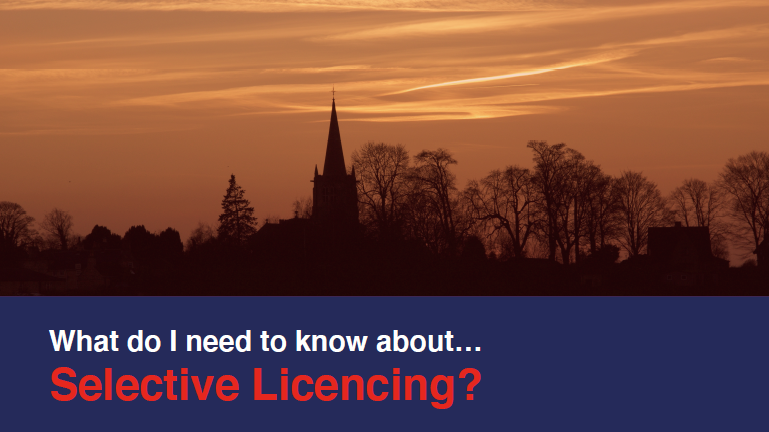SELECTIVE LICENCING

What is Selective Licensing?
Selective licensing was introduced in 2006 to try to reduce socially unacceptable behaviour. In areas where selective licensing applies, landlords must apply for a licence if they want to rent out a property which means the council can check whether they are a “fit or proper person” to be a landlord, as well as making other stipulations concerning the management of the property and appropriate safety measures.
Unfortunately, thousands of landlords are unaware they are in a selective licensing area and are unintentionally breaking the rules by not holding a licence. The punishments for this can be very high and Landlords can be forced to pay 12 months’ rent back to a tenant or may even be unable to rent out a property in future.”
Are you in a selective licensing area?
To avoid the harsh punishments, landlords must find out whether they are in an area covered by a scheme. Landlords in London can use the London Property Licensing website londonpropertylicensing.co.uk (http://www.londonpropertylicensing.co.uk/), but in all other areas, checking with the local council is the safest way to find this information.
Any council can introduce a scheme if it is satisfied there is a problem with low housing demand or where there are significant and persistent problems of antisocial behaviour. A scheme will usually only cover certain areas of a city, and under new rules only 20pc of a council’s area can be selectively licensed without a special application being made – although this does not apply in all cases.
Selective licensing schemes run for five years once they have been granted.
Do I need a selective license for my property?
If your Buy-to-Let or rental property is within a Selective Licensing Scheme area then 99.9% yes.
Whether it is a flat, house or bungalow, every single rental property in that area must have a Selective Licence with a very few exceptions.
What must landlords do?
If you find out you are in a selective licensing area, your council will have an application form to apply for a licence. The fees for this can vary for each of the different areas and depending on the property style too.
The council may want to see copies of safety certificates and to know the location of smoke and carbon monoxide detectors, as well as copies of your tenancy agreements.
If the landlord lives abroad someone else will need to hold the licence on their behalf, in which case the council will check the person making the application is suitable and is involved in the day-to-day management of the property.
Are any properties exempt?
The main exceptions are that your property needs a different type of licence such as:
- A Mandatory HMO Licence
If it houses 5 or more persons (NB persons, not bedrooms) where they are not all one ‘household.’
- An Additional Licence for HMOs
In many council areas, they have introduced additional Licensing schemes to make HMOs of 3 persons (where they are not all related) require an Additional HMO licence.
So for 99.9% of Buy-to-Let or rental properties in a Selective Licensing Scheme area, unless it requires an HMO license your Property REQUIRES A SELECTIVE LICENCE.
In Selective Licensing Scheme areas where smaller HMOs of 3 or 4 persons are not covered by and Additional HMO Licensing scheme these properties MUST have a selective licence.
Some properties are exempt from selective licensing. These include:
- Holiday lets
- Business premises
- Student premises where the university manages the property
- Premises where the tenant is a family member
What happens if you breach your licence?
You could be prosecuted or face a penalty of anything up to £30,000.
Here are some of the areas that have introduced selective licensing:
- Brent
- Croydon
- Durham
- Hastings
- Liverpool
- Newham
- Oldham
- Peterborough
- Southwark
- Thanet
- Waltham Forest
- Nottingham
What are the requirements for a Selective Licence?
You must pass the council’s tests for:
- Property management competence
- The suitability of your management structures
- You must inform ‘Relevant Persons’ that you are applying for a Selective Licence, (these may cover people such as your mortgage provider, freeholder, insurers, managing agents, etc.)
- You will be required to state that your property fully complies with all the relevant legislation, regulations and health and safety standards. (There are hundreds of them so make sure you do your research!)
How do I apply for a Selective Licence?
While it is possible to undertake the application process yourself, we would advise against this because of the many pitfalls. If you do choose to apply on your own, it is essential that you familiarise yourself with all of the standards such as the Housing Health and Safety Rating System and your council’s specific selective licensing standards before applying for a licence.
Please be aware that if you accept Selective Licence Conditions (and most landlords do without questioning them) you become liable as a Criminal Offence if at any point during the licence if you fail to comply with any condition.
So be very, very careful or get expert help.
Landlord Licensing & Defence offers a complete hand-holding service for landlords including compliance checks, licence application preparation and submission, progression and also fighting against over-bearing licence conditions on your behalf against the draft licence.
I’ve just realised my property should already have a Selective Licence, but I didn’t apply for one.
This is very serious and the Council can potentially take you to court or issue you with a Civil Penalty Fine of up to £30,000.
If in doubt, we strongly advise you NOT to talk to your council – as they are now your Prosecutor and you must seek professional help from us or other specialists. We do strongly advise seeking help from a specialist and doing your own research, there is now a wealth of information to digest further about these schemes as they have been around since 2006 and are seemingly becoming more prevalent; so even if you’re not affected by this now, you may be in the future.
Interested?
Related Guides:

